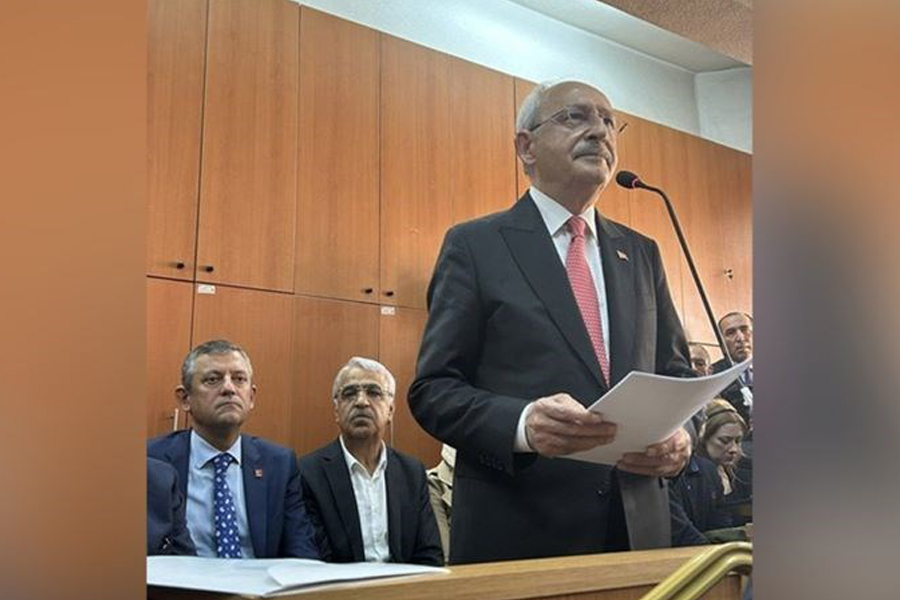Turkey’s far-right Nationalist Movement Party (MHP) has withdrawn a criminal complaint against former Republican People’s Party (CHP) leader Kemal Kılıçdaroğlu over his past remarks on Syrian Kurdish militants and a jailed Kurdish politician, following an order from its leader, Devlet Bahçeli.
The complaint, filed in 2022 by senior MHP officials, accused Kılıçdaroğlu of “praising crime and criminals” under Article 215 of the Turkish Penal Code for his public statements defending imprisoned Kurdish politician Selahattin Demirtaş and describing the Syrian Kurdish militia, the People’s Protection Units (YPG), as a force “defending its homeland.” The case, which was accepted by a high criminal court in Ankara, had exposed Kılıçdaroğlu to a potential prison sentence of more than three years.
MHP Deputy Chairman Feti Yıldız announced the decision to withdraw the complaint Wednesday on social media, citing Bahçeli’s directive. The move followed Bahçeli’s speech at a party meeting in which he called for a new approach, stating, “We are determined to build a century without terrorism through unity and a fair struggle that will not harm our nation.”
The development comes as President Recep Tayyip Erdoğan and his ruling Justice and Development Party (AKP) have recently reopened dialogue with Kurdish political representatives, including a high-profile visit to Abdullah Öcalan, the jailed leader of the outlawed Kurdistan Workers’ Party (PKK). The visit, the first since 2015, has raised speculation over new peace talks amid changing dynamics in Syria with the fall of Bashar al-Assad.
Kılıçdaroğlu, who led the CHP from 2010 to 2023, had long been a vocal critic of the government’s crackdown on opposition voices. The MHP’s complaint centered on statements he made between 2010 and 2022, including a 2019 interview in which he argued that Demirtaş, the former co-chair of the pro-Kurdish Peoples’ Democratic Party (HDP), was imprisoned for political reasons rather than any direct links to terrorism. He had also criticized Turkey’s policy on Syria, particularly its labeling of the YPG as a terrorist organization, and defended detained journalists and opposition politicians accused of terrorism-related offenses.
MHP officials, including Yıldız, had previously accused Kılıçdaroğlu of glorifying criminals and terrorist organizations by making such statements. The case against him was filed as part of a broader wave of legal action against opposition figures under Turkey’s sweeping counterterrorism laws, which rights groups have criticized as a tool for silencing political dissent.
The withdrawal of the MHP’s complaint marks a rare de-escalation in Turkey’s polarized political landscape, where legal cases against opposition politicians are often used as leverage in political negotiations.
Bahçeli has historically taken a hardline stance against Kurdish political movements. However, in a surprising turn in October, he suggested that Öcalan be released and allowed to address a parliamentary group meeting of the pro-Kurdish party if he agreed to disband the PKK.
Erdoğan allowed two members of the pro-Kurdish Peoples’ Equality and Democracy Party (DEM Party) to visit Öcalan in prison in December, marking the first such meeting in nearly a decade.
Analysts say these moves are linked to Turkey’s shifting foreign policy priorities, particularly in Syria. Erdoğan has faced mounting challenges as Kurdish forces in Syria, backed by the US, consolidate their control over northern regions. With the Syrian Democratic Forces (SDF) gaining strategic ground and the potential for political realignment in Damascus, Erdoğan may be seeking to regain influence over Kurdish political dynamics inside Turkey.



